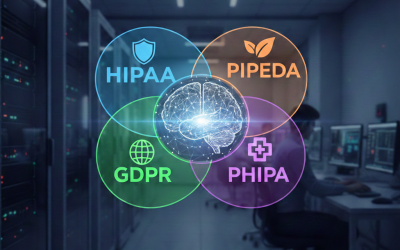Why Privacy Matters in AI MVPs
When developing an AI healthcare MVP, integrating privacy by design principles is critical from the earliest stages. Privacy isn’t just a regulatory checkbox — it’s a core component of trust, patient security, and long-term business sustainability. Implementing privacy-first practices enhances scalability, fosters trust, and positions your product as a market leader in ethical AI deployment. However, neglecting privacy can lead to costly compliance failures, loss of user confidence, and damage to your brand.
Incorporating privacy from the outset ensures that your AI system adheres to critical standards and protects sensitive health data. Privacy by design sets the stage for a healthcare AI MVP that not only meets legal requirements but is trusted by end users.

Data Minimization and its Importance
Data minimization is one of the foundational principles of privacy by design. This approach ensures that only the minimum necessary data is collected and processed, reducing the potential for breaches and misuse. By limiting the data collected, AI systems are more secure, and users feel more in control of their personal information.
- Reduces the risk of data breaches: The more data you store, the more attractive you become to cybercriminals. Limiting data collection decreases your exposure.
- Prevents the misuse of data: By only collecting essential information, you reduce the risk of inadvertently storing sensitive data that could later be misused.
- Maintains user trust: Transparent data collection practices inspire confidence, as users appreciate the restraint and consideration for their privacy.
For further information on minimizing data risks, consult resources like NIST’s Cybersecurity Framework
Techniques in Effective Encryption
Effective encryption is one of the most crucial techniques in ensuring data privacy, especially in the context of healthcare AI. Encryption is the process of converting sensitive data into a format that only authorized users or systems can access, ensuring that even if data is intercepted, it remains protected.
Common encryption methods used in healthcare AI include:
- Public Key Encryption (PKE): A secure method for transferring data, where two keys (public and private) are used to encrypt and decrypt information.
- Advanced Encryption Standard (AES): A symmetric encryption algorithm widely used for securing sensitive data in healthcare applications.
- Quantum Key Distribution (QKD): A cutting-edge method of encryption that leverages the principles of quantum mechanics to safeguard data.

Understanding and Implementing Consent Flows
Consent management is at the heart of ethical AI data handling. Implementing effective consent flows ensures users have control over their personal data and allows them to understand how their information will be used. A well-designed consent flow is transparent, easy to navigate, and allows users to make informed decisions.
- Clear communication: Consent requests should be explicit, easy to understand, and presented in a transparent way. Clearly communicate the type of data collected, the purpose, and how it will be used.
- Capability to withdraw consent: Users must be able to withdraw their consent as easily as they provided it. Make this process straightforward to reinforce trust.
- Documentation of consent: Keeping a reliable log of consents is vital for compliance and accountability. Ensure that all consent records are secure and accessible.
Choosing the Right Vendor for AI MVP Development
When selecting a vendor for your healthcare AI MVP, it’s crucial to assess their commitment to privacy. Look for vendors who implement strong privacy practices and are fully aligned with the principles of data protection and security.
- Vetting vendors: Ensure that vendors understand the importance of privacy and security and have proven methods for protecting sensitive data.
- Qualifying vendors: Further assess the vendor’s policies on consent management, encryption techniques, and data minimization practices. The right vendor will demonstrate a thorough understanding of healthcare regulations like HIPAA and GDPR.
Consider reviewing the vendor’s previous projects or certifications, such as compliance with WHO guidelines on AI in healthcare.
Final Thoughts on AI Privacy by Design
“Adapting to AI Privacy by Design is not just about compliance, but it is a strategic move towards trust-building with customers and partners. Embrace it early and make it an integral part of your AI MVP development journey.”
By incorporating privacy by design from the start of your AI MVP development process, you’re not only meeting regulatory standards but also fostering trust with patients and stakeholders. This proactive approach positions your healthcare AI product for long-term success and sustainability.
Useful Links:















